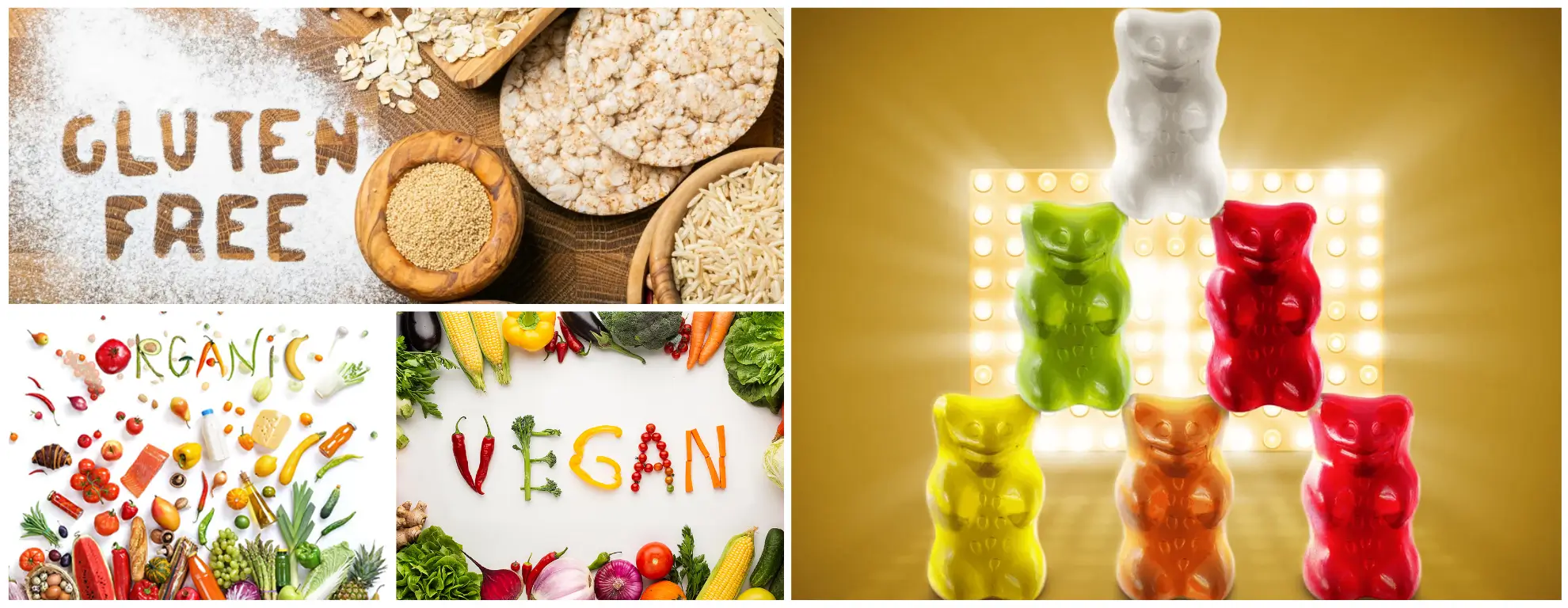Gummy bears are a beloved treat enjoyed by people of all ages, but for those with gluten sensitivities or celiac disease, it’s important to know whether they’re safe to eat. While many gummy bears are gluten-free, some brands may use ingredients or manufacturing processes that introduce gluten.
Most gummy bears are gluten-free, but it’s essential to check labels for hidden gluten-containing ingredients like wheat starch or cross-contamination during production. Choosing certified gluten-free brands ensures safety for those with gluten intolerance.
This article will discuss what makes gummies not gluten-free and explore common gummy bear labels, such as gelatin, vegan, halal, plant-based, non-GMO, and organic options.
What Makes Gummies Not Gluten-Free?
While many gummy bears are gluten-free, certain factors can introduce gluten into the product.
Gummy bears may not be gluten-free if they contain wheat-based starches, barley malt, or are processed in facilities that handle gluten-containing products. These hidden ingredients or cross-contamination risks can make them unsafe for individuals with gluten sensitivities.
Always look for certifications or labels indicating gluten-free status. Even trace amounts of gluten from cross-contamination can cause issues for those with celiac disease, making label-checking essential.
Common Gluten Sources in Gummy Bears
| Ingredient | Potential Source of Gluten |
|---|---|
| Wheat Starch | Used as a binder or thickener |
| Barley Malt | Flavoring agent |
| Cross-Contamination | Shared equipment with gluten foods |

Gummy Bear Labels
Modern gummy bear brands cater to various dietary and ethical needs. Here are the most common labels you’ll find:
- Gelatin-Free
- Vegan
- Halal
- Plant-Based
- Non-GMO
- Organic
Each of these labels indicates a specific attribute about the product. Let’s explore what each label means in detail.
Gelatin-Free Gummy Bears
Gelatin-free gummy bears are made without animal-derived gelatin, making them suitable for vegetarians or those avoiding animal products. Instead, they use alternatives like pectin, agar-agar, or carrageenan for texture.
Gelatin-free gummies cater to individuals who prefer plant-based or animal-free options. These alternatives also make the gummies suitable for kosher and halal certifications, provided other criteria are met.
Vegan Gummy Bears
Vegan gummy bears exclude all animal-derived ingredients, including gelatin and food colorings made from insects, like carmine. They rely on plant-based thickeners and natural dyes for their appearance and texture.
Vegan gummies are ideal for those adhering to a plant-based diet. Popular vegan brands ensure no animal testing is involved in their production process, further supporting ethical choices.
Halal Gummy Bears
Halal gummy bears meet Islamic dietary laws by excluding pork-derived gelatin and using halal-certified ingredients. These gummies are often made with beef gelatin or plant-based alternatives.
Halal certification ensures the entire production process complies with Islamic guidelines, making these gummies accessible to Muslim consumers worldwide.
Plant-Based Gummy Bears
Plant-based gummy bears are free of animal products and often focus on natural ingredients. They are similar to vegan options but emphasize the use of minimally processed components, such as fruit purees or natural sweeteners.
These gummies appeal to health-conscious consumers seeking clean-label products. Plant-based gummies often contain fewer artificial additives, making them a wholesome treat.
Non-GMO Gummy Bears
Non-GMO gummy bears are made without genetically modified ingredients, ensuring a natural and sustainable product. This label is important for consumers avoiding genetically engineered foods.
Non-GMO certification is particularly popular among environmentally conscious shoppers, as it supports transparency and sustainable farming practices.
Organic Gummy Bears
Organic gummy bears are made with certified organic ingredients, free from synthetic pesticides, artificial flavors, and preservatives. They prioritize quality and sustainability.
Organic certification guarantees that the product meets strict standards, making it a premium choice for consumers seeking a healthier, eco-friendly option.
How Can I Find Gummy Bears That Meet These Labels?
Finding gummy bears that meet specific labels like gluten-free, vegan, or organic requires careful research and label-checking. Look for certifications on the packaging, such as "Certified Gluten-Free," "Non-GMO Verified," or "USDA Organic," to ensure the gummies meet your dietary and ethical requirements.
At Nutreebio, we specialize in custom gummy manufacturing, offering clients the flexibility to create products tailored to their needs. Whether it’s gluten-free, halal, organic, or vegan gummies, we can customize formulas to meet any label or ingredient requirement, ensuring compliance with strict industry standards. This makes us a trusted partner for B2B clients looking for premium gummy products.
For businesses, partnering with a manufacturer like Nutreebio ensures complete control over the ingredients, labels, and certifications to satisfy consumer demands in today’s diverse market.
Conclusion
Gummy bears can be gluten-free, but it’s crucial to read labels carefully to avoid hidden gluten ingredients or cross-contamination. With various gummy bear labels like vegan, halal, plant-based, and organic, there’s a wide range of options to suit dietary preferences and needs. Always choose reputable brands and certifications for the safest and most enjoyable experience.


